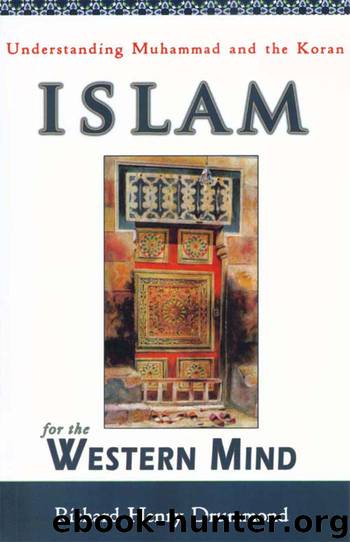Islam for the Western Mind by Richard Henry Drummond

Author:Richard Henry Drummond
Language: eng
Format: epub
Publisher: Hampton Roads Publishing
Published: 2005-08-17T16:00:00+00:00
The Position and Role of Women in the Koran
The Koran teaches that before God the ethical obligations of women and men are the same. God’s treatment of them is the same. In a mid-Medinan surah, Muhammad stresses the obligations common to both men and women, namely, faith, obedience—to God and his Messenger—speaking the truth. He emphasizes the divine call to both women and men to be patient in endurance, generous in almsgiving, faithful in fasting, pure in their sexual relationship—to be “men and women who remember God oft.” For such, God has prepared both “forgiveness and a mighty wage” (K 33:30–36). Without distinction of male or female, God will grant the means to live a goodly life, inner and outer, for whoever “does a righteous deed.” Each shall receive recompense, a wage “according to the best of what they did” (K 16:99).
According to a very early Meccan surah, God created the male and female (K 92:4). Indeed, God created “all the pairs of what the earth produces,” a reason to give glory to God (K 36:36). Muhammad suggests that God has placed “much good” in women (K 4:23). Nevertheless, even where Muhammad states that women have rights of honor that all are obligated to acknowledge as their divinely set due, he claims that men have been put “a degree above” women. In another passage, Muhammad states as a fact of life that men are “managers of the affairs of women,” for the reason apparently that God has been more generous toward men in his bounty (in all categories?) and the latter have given of their financial means for the care of women. In this context, hearers are assured that a proper response of religiously righteous women is to be obedient, presumably also to their husbands. In fact, the passage goes on to state that husbands may admonish, banish to beds apart, and even beat their wives if they “fear” that their wives “may be rebellious” (K 2:228; 4:38).
We may properly recall, however, that both surahs in which these last statements are contained were composed in the Medinan period, that is, a number of years after the death of Muhammad’s first wife, Khadijah. One wonders if statements of the superiority of men over women in any way could have been made by Muhammad during the lifetime of Khadijah. In fact, there is no evidence in or out of the Koran that they were. Muhammad owed his relative financial security to Khadijah’s means and probably also to her continuing mercantile activity after their marriage. (His commitment to the prophetic call and an intensely disciplined religious life of prayer and proclamation, teaching and pastoral care would have left him little time for the oversight of Khadijah’s presumed ongoing mercantile activity.) Theirs was evidently a highly successful achievement in distinct but cooperative and mutually respectful roles.
In the next section, on Muhammad’s views of pagans, I note the relatively low position of women cited as characteristic in pre-Islamic Arabia. I also note Muhammad’s sharp criticism and vigorous rejection of the relatively common practice of burying unwanted female babies alive.
Download
This site does not store any files on its server. We only index and link to content provided by other sites. Please contact the content providers to delete copyright contents if any and email us, we'll remove relevant links or contents immediately.
The History of Jihad: From Muhammad to ISIS by Spencer Robert(2628)
Nine Parts of Desire by Geraldine Brooks(2369)
The Turkish Psychedelic Explosion by Daniel Spicer(2357)
The First Muslim The Story of Muhammad by Lesley Hazleton(2271)
The Essential Rumi by Coleman Barks(2047)
1453 by Roger Crowley(2031)
The Last Mughal by William Dalrymple(1858)
Trickster Travels: A Sixteenth-Century Muslim Between Worlds by Davis Natalie Zemon(1847)
Muhammad: His Life Based on the Earliest Sources by Martin Lings(1647)
God by Aslan Reza(1644)
by Christianity & Islam(1633)
A Concise History of Sunnis and Shi'is by John McHugo(1567)
No God But God by Reza Aslan(1545)
Magic and Divination in Early Islam by Emilie Savage-Smith;(1534)
The Flight of the Intellectuals by Berman Paul(1503)
Nothing to Envy by Barbara Demick(1450)
Art of Betrayal by Gordon Corera(1431)
What the Qur'an Meant by Garry Wills(1394)
Getting Jesus Right: How Muslims Get Jesus and Islam Wrong by James A Beverley & Craig A Evans(1342)
